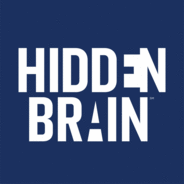Imagine a concrete room, not much bigger than a parking space. You're in there 23 hours a day, 7 days a week. This is the reality of solitary confinement at prisons across the United States. Keramet Reiter, a criminology professor at UC Irvine, says that while some inmates in solitary are dangerous, others are there because they're difficult for prisons to manage, or because of bureaucratic inertia. This week on Hidden Brain, we look at what happens in solitary confinement, and the psychological effects of being alone for long periods of time.

Wissenschaft & Technik
Hidden Brain Folgen
Why do I feel stuck? How can I become more creative? What can I do to improve my relationships? If you’ve ever asked yourself these questions, you’re not alone. On Hidden Brain, we help you understand your own mind — and the minds of the people around you. (We're routinely rated the #1 science podcast in the United States.) Hosted by veteran science journalist Shankar Vedantam.
Folgen von Hidden Brain
569 Folgen
-
Folge vom 04.04.2017Ep. 67: The Hole
-
Folge vom 28.03.2017Ep. 66: Liar, LiarEditor’s note: Since this episode first aired, researchers have raised concerns about a number of studies authored by Dan Ariely, including one cited in this episode. That study included data from an insurance company that purported to show that people are more truthful when they sign an ethics declaration at the beginning of a form than at the end. In an independent review, a group of researchers found evidence of data fabrication in that study. You can read more about their findings here, along with Dan Ariely’s response. The insurance company that provided the data, The Hartford, released a statement to NPR’s Planet Money in July 2023. In that statement, the company said that it had done a review of its records and that “there appear to be significant changes made to the size, shape and characteristics of our data after we provided it and without our knowledge or consent.” You can hear the full Planet Money story and read the full statement from The Hartford here. Additionally, a second study cited in this episode – in which Ariely reported reduced cheating among test-takers asked to recall the Ten Commandments before taking the test – has not stood up to replication by other researchers. You can read more about that here. Everybody lies. This is not breaking news. But what separates the average person from the infamous cheaters we see on the news? Dan Ariely says we like to think it's character — but in his research he's found it's more often opportunity. Dan Ariely is a professor at Duke University and the author of the book The Honest Truth About Dishonesty: How We Lie to Everyone — Especially Ourselves.
-
Folge vom 21.03.2017Episode 65: Tunnel VisionWhen you're hungry, it can be hard to think of anything other than food. When you're desperately poor, you may constantly worry about making ends meet. When you're lonely, you might obsess about making friends. This week on Hidden Brain, we explore the psychological phenomenon of scarcity and how it can affect our ability to see the big picture and cope with problems in our lives.
-
Folge vom 14.03.2017Ep. 64: I'm Right, You're WrongThere are some topics about which it seems no amount of data will change people's minds: things like climate change, or restrictions on gun ownership. Neuroscientist Tali Sharot says that's actually for good reason. As a general rule, she says, it's better to stick to your beliefs and disregard new information that contradicts them. But this also means it's very difficult to change false beliefs. This week, we look at how we process information, and why it's so hard to change our views.
